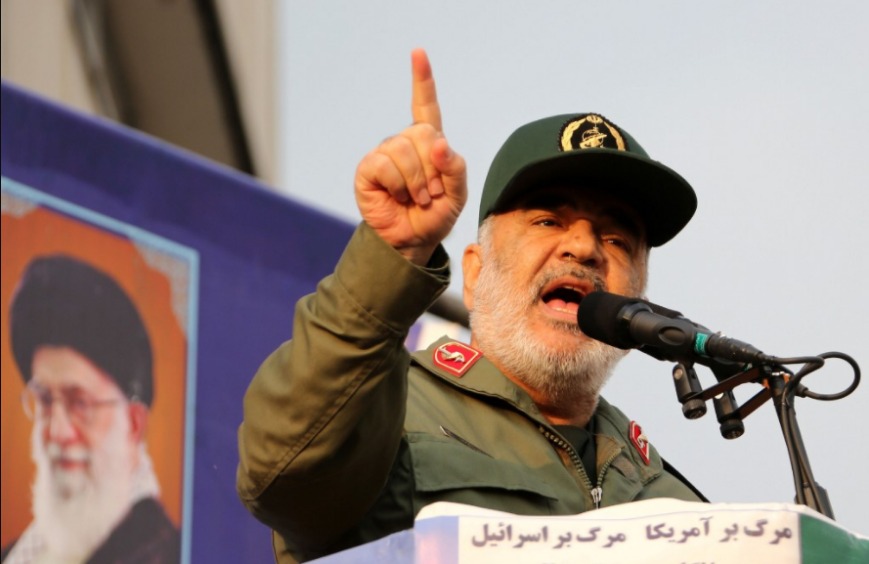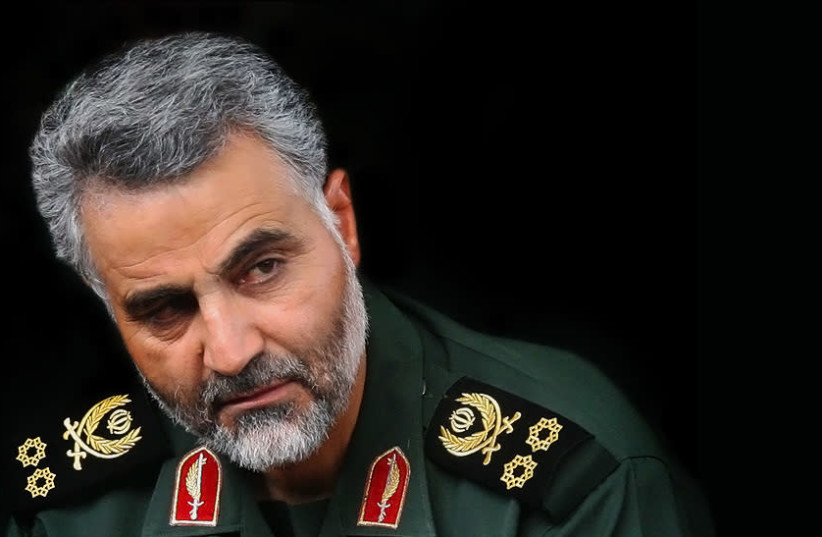IRGC commander Hossein Salami bragged that the US is losing on all fronts. “We see the symbols of victory and the signs of retreat and defeat of the enemy,” he said.
Iranian Islamic Revolutionary Guard Corps Commander Maj.-Gen. Hossein Salami this week celebrated the “retreat” of Iran’s enemies in the region. “We are witnessing obvious retreats of enemies and great powers from the region,” he was quoted by Iran’s Tasnim News Agency as saying. He was referring to the US leaving Afghanistan.
“These days, we look at the retreat and the last months of the US presence in Iraq,” he said. “We see their failure in the dangerous Lebanese project. We see the defeat of enemy targets on the Syrian front; we see the defeat of the enemy’s goals and movements in the sanctions against Iran, and we see the defeat of the enemy in the political and economic siege of our system.”
Salami bragged that the US is losing on all fronts. “We see the symbols of victory and the signs of retreat and defeat of the enemy,” he said.
While he sees positive portents of Iran’s victory, another Iranian supporter was also giving an interview to Tasnim. Talal Naji, secretary-general of the Popular Front for the Liberation of Palestine General Command, looked at the recent May battle between Israel and Hamas in the Gaza Strip.
He praised Qasem Soleimani, the late commander of the IRGC’s Quds Force, for his “prominent role in countering US-Zionist conspiracies and strengthening and advancing the defense of resistance groups in the region, especially Palestine, Syrian relations and the resistance, and [removing] obstacles to the advancement of Palestinian national unity.”
Naji discussed the importance of the recent battles in May, noting that Palestinians across Israel, which he calls “the occupied territories of 1948,” were involved in clashes with Israelis.
“The Palestinian resistance in the Gaza Strip took the initiative to help Quds [Jerusalem],” he said, adding that “the most important achievement of the Battle of the Sword of Quds [the May war between Israel and Hamas] was the realization of the national unity of the people among all spectrums of the Palestinian nation.”
“Most Palestinians are lovers of the Islamic Republic of Iran,” he claimed. “This love is not just because of fascination with the Islamic Republic, but because of objective reasons.”
NAJI WENT on to say: “Soleimani played a major role in the development of missiles in the Gaza Strip. The battle of the Sword of Quds and the achievements of the resistance in it were among the effects of Martyr Soleimani, the great commander.” The US killed Soleimani in 2020, turning him into a “martyr.”
The PFLP-GC leader said Soleimani “personally supervised the training, weapons transfer and development of weapons [for Palestinians].” The recent war was different than those in the past because of the riots across Israel, he said, adding: “Three generations have passed since the tragedy of 1948, and this is the third generation. We revolted in 48 lands: In all the Palestinian lands, 48 in all the villages, towns and cities in Al-Nusra, Acre, Jaffa, Umm al-Fahm, Tayyiba, Ara, Arara” and other areas.
Despite the technological power of the US and the “Zionist regime,” the Palestinians have mobilized against Israel with the support not only of Soleimani, but also the late Abu Mahdi al-Muhandis, a Shi’ite leader in Iraq who the US also killed with Soleimani in 2020, he said.
It has been thought that Iranian-backed Shi’ite militias in Iraq have been growing closer to the Palestinians in recent years. This may be evidence of that.
Palestinian relations with Syria have grown stronger, Naji said, adding that he was happy to see some in the US Congress critique Israel in recent months. He also bashed Gulf states that have “normalized” relations with Jerusalem.
IN HIS discussion, Naji slammed the Oslo Accords, saying: “We want the realization of the national unity of Palestine, because, as you know, one of the conditions for the victory of any nation in the world against any foreign enemy that occupies its land, confiscates its rights and displaces its inhabitants is national.”
He then, oddly, praised the Trump administration. “The issue of the two-state solution goes back to the initiator of the plan and the owner of the two-state solution, the US government, while the position of then-president Donald Trump was clearly that this solution and this goal were left off of the negotiating table,” he said.
“As you know, Trump and his son-in-law [Jared] Kushner and many American officials have said that this is not a viable solution, and that it is impossible to implement it,” he said. “The solution is not discussed and common, and its realization is impossible.”
Naji aid the West Bank has become like “Swiss cheese,” with small areas of Palestinian Authority control. Ultimately, the Palestinians need to achieve unity, as they did during the May conflict, and spread conflict across all of Israel, he said. Iran’s support is apparently essential to this.
READ ALSO: US, Foreign Companies Leaving China
Iran’s project across the region now includes not only support for the Palestinian groups, as well as Hezbollah and groups in Iraq, but also attempts to divide European countries regarding the Iran deal. Tehran is slow-playing the deal in Europe, hoping to get more concessions. Iran doesn’t seem to want more negotiations now.
The larger context is that Iran uses its media to transmit its goals. The interview with the PFLP-GC leader is not really about what that small group can accomplish, but to inform readers that the Palestinians care about Iran’s support and that Iran investing resources in Iraq, Syria, Lebanon, and Gaza is effective. Many Iranians are tired of the regime wasting funds abroad while people are poor at home.
The messaging about the May conflict is clear: Iran wants to push Gaza into a new war, hoping that Israel will suffer diminishing returns fighting such wars.


